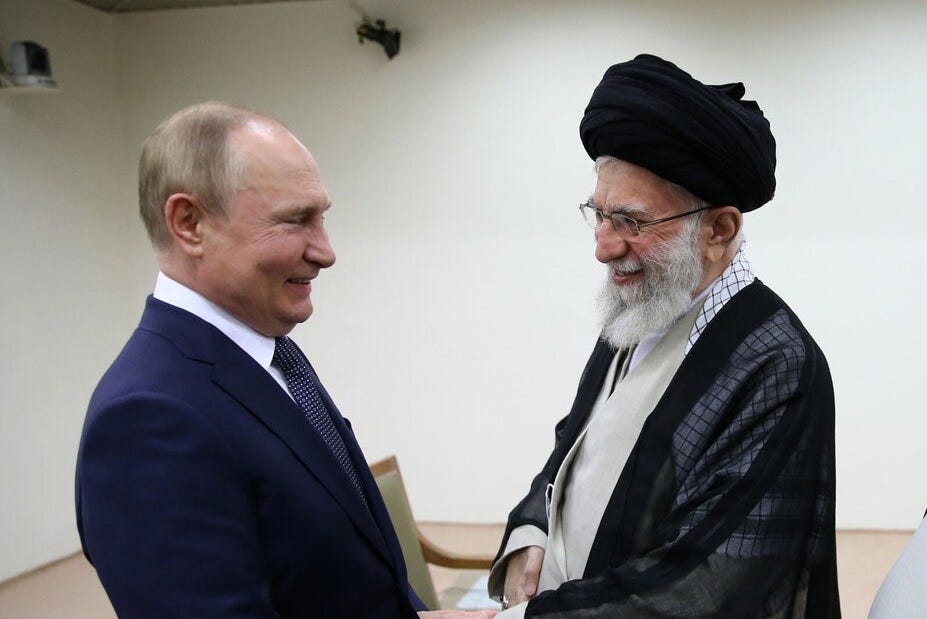
In the aftermath of the October 7, 2023, attacks, the infamous Bush-era term “Axis of Evil” saw a comeback.
In his January 2002 State of the Union address, then-President George W. Bush proclaimed Iran, Iraq, and North Korea part of an emerging group of states seeking to develop and supply nuclear weapons to terrorist organizations. Bush declared:
“States like these, and their terrorist allies, constitute an axis of evil, arming to threaten the peace of the world. By seeking weapons of mass destruction, these regimes pose a grave and growing danger. They could provide these arms to terrorists, giving them the means to match their hatred. They could attack our allies or attempt to blackmail the United States. In any of these cases, the price of indifference would be catastrophic.”
A staple of Bush’s Freedom Agenda, the term has since faced significant criticism for failing to capture the deeper nuances of Middle Eastern geopolitics. For example, while the term “axis” suggests an alliance, Iran and Iraq were rivals at the time.
Since the onset of the Gaza war, the term has been increasingly reused in Western foreign policy circles to describe the growing cooperation between China, Russia, Iran, and North Korea. In a Foreign Affairs piece last year, analysts Andrea Kendall-Taylor and Richard Fontaine labeled these four states as the “Axis of Upheaval,” arguing they aim to overturn the U.S.-led world order.
However, as in 2002, the use and framing of the term have received criticism. Ian Bremmer, for instance, has noted that China—unlike the other states mentioned—seeks global stability, not upheaval.
The ongoing Israel-Iran war has also raised questions about the term’s reuse, especially regarding relations between Moscow and Tehran.
Though the Islamic Republic is allied with Russia, the Kremlin has thus far refrained from supplying Iran with weapons to counter Israel, even as the mullah regime finds itself at its weakest point in years.
Instead, Russia’s response has remained purely diplomatic. Moscow condemned Israel’s strikes on Iran. A day after the initial attacks, American President Donald Trump and Russian President Vladimir Putin held a lengthy phone call discussing the war, during which Putin offered to mediate between Tel Aviv and Tehran.
All of this challenges the increasingly common notion that Russia and Iran are in a united front against the West.
In recent years, ties between Russia and Iran have indeed deepened across many fronts.
Economically, Russia has become Iran’s top foreign investor, supporting various infrastructure, gas, and energy projects.
In January, the two countries signed a strategic partnership treaty aimed at boosting Russian investment in Iran’s security and energy sectors.
They have also cooperated closely in Damascus, where both supported former President Bashar al-Assad during Syria’s civil war.
More recently, Iran has supplied weaponry—such as the Shahed drones—to Russia for its war in Ukraine.
Yet the cooperation between Moscow and Tehran has little to do with shared ideology, particularly given their contrasting governance models. Russia is a secular presidential republic; Iran is an Islamist theocracy.
Rather, their alliance is strategic, driven by shared hostility towards the U.S.
Cracks in the relationship are evident in Russia’s broader Middle East policy, where it enjoys ties with many of Iran’s regional adversaries, including Israel.
In Syria, despite their cooperation, Moscow and Tehran have competed for influence over Damascus. To advance its position, Russia even allowed Israeli strikes against Iranian targets by opening Syrian airspace. This is one reason why Israel—despite being closely aligned with the U.S. and other Western states—has refrained from arming Ukraine.
Moreover, Putin is keen on maintaining ties with Trump, who he believes could bring an end to the Russia-Ukraine war on terms more favorable to Moscow. Arming Iran would risk further straining U.S.-Russia relations and by extension derail that aim.
Additionally, the emerging oil crisis triggered by the war has caused global oil prices to surge. For a heavily sanctioned petrostate like Russia, this economic windfall provides much-needed relief amid a constrained wartime budget.
Finally, amid its international isolation, Russia’s offer to mediate may also be an attempt to rehabilitate its global image by playing a role in resolving the conflict. This would not only bolster the Kremlin’s international standing but also capitalize on rising anti-American sentiment across the Middle East, fueled by widespread backlash to U.S. support for Israel.
Ultimately, while the collapse of the Islamic Republic would undoubtedly deal a blow to Russia’s influence in the region, framing Moscow-Tehran relations as a “special relationship” in complete lockstep fails to capture the geopolitical complexity of the Middle East—just as Bush’s “Axis of Evil” speech failed to do in 2002.




